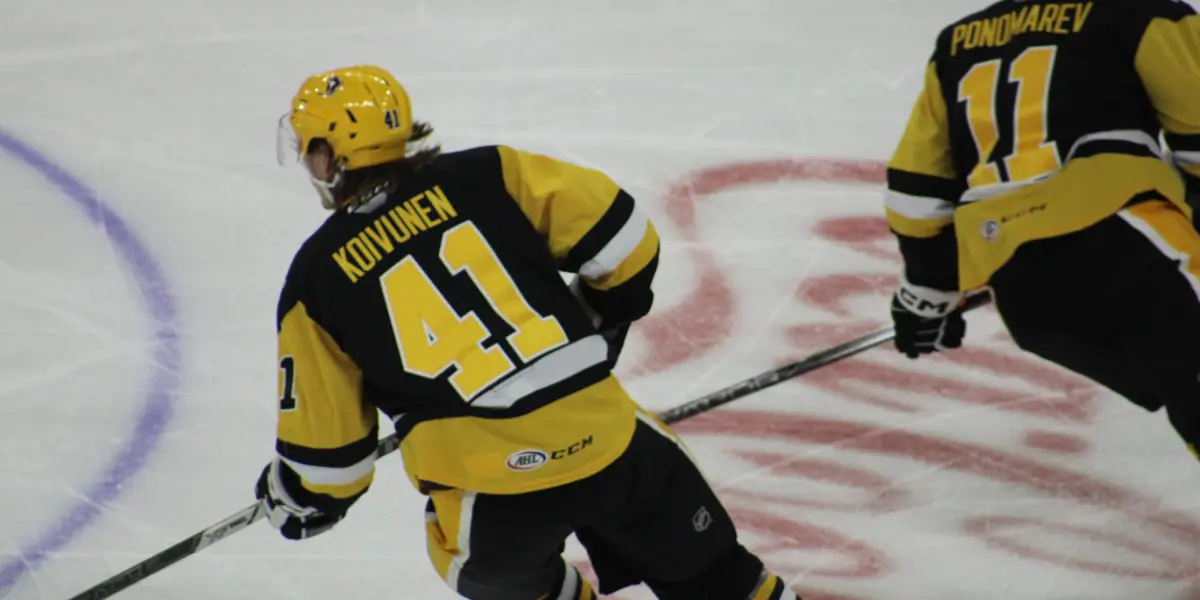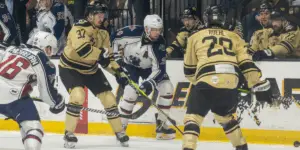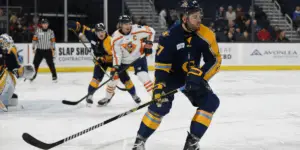
Proper player development is one of the key attributes an organization should have in its farm system. The AHL and ECHL exist for a reason: to help improve the play of an NHL team and its prospects or future players.
Developing a player at any level means bringing players in and developing their skills at a higher level so they can compete at the next level, whether that be from the ECHL to the AHL or the AHL to the NHL. Coaches focus on developing a player’s hockey IQ, physicality, leadership skills on and off the ice, and locker room presence.
Player’s Perspective:
Top prospect for the AHL Affiliate of the Pittsburgh Penguins, Wilkes-Barre/Scranton Penguins, Ville Koivunen, spoke on his time playing in Finland and coming over to North America. There is always an adjustment period for players coming from overseas. “I had confidence coming here and pushing my strength here and playing with my eyes and not thinking too much. I am always learning something and adjusting to playing all the time.”
Koivunen played in the World Juniors Championship in 2020-2021, 2021-2022, and 2022-2023. In the 2022-2023 WJC, Koivunen wore the “A” for WJC-20 and “C” for International-Jr. “That was fun. Of course, it was nice to wear letters, and it felt very good to have a good team.”
Koivunen came over to North America and was assigned to the Wilkes-Barre/Scranton Penguins. During that time, he helped to assist in the short Calder Cup Playoff run. He talked about some things he learned during that time that he will apply to his play this year. “Everything comes a little faster [at this level], so I have to be ready for it.”
Coach’s Perspective:
Coaching at each level is also an adjustment. Hockey fans have seen coaches move from the AHL to the NHL due to changes in the coaching staff this season alone. The Head Coach of the Wilkes-Barre/Scranton Penguins, Kirk MacDonald, played and coached in the ECHL.
MacDonald coached the ECHL Reading Royals to the playoffs three times. One year was canceled due to the COVID-19 pandemic.
MacDonald spoke on what it is like adjusting to coaching in the ECHL and AHL:
“Mindset is the same, but it’s a lot different. I don’t think I have enough time to talk about it, but the ECHL pretends to be development league, but they really don’t want to be one with the amount of games in the schedule. You have to teach a lot through video versus practice.
We are having four day weeks of practice right now. We are getting development ice, puck touches, in the gym. You know, it is a heavy schedule. We’ll have our heavy parts of the year, but there is so much more available to us with regards to time to actually help make these guys better hockey players, and it’s a lot of fun.
As a coach, that’s what you can focus on here. You are not trying to juggle 20 different things every day. You can get out there and really work with the guys. Whether it’s video, in the gym, skill development on the ice, incorporating that into the team practice. There’s also different elements to it that again, you just don’t have time in the day or practice time, because you are juggling so many different things.
It’s a great league for coaches to develop right? And probably goalies, but it’s really hard for the players to put them in a position to succeed just because of the schedule. Playing four or five, six and eight, seven and ten, like can’t practice. If you can’t practice, you can’t get better right? Putting the guys in better positions that have success just because you give them more practice reps and that’s the most important thing.
I learned a ton in the ECHL, but it is tough for the players to develop just the way the schedule is.”
It’s important to develop not only the players who are constantly working on strengths and weaknesses but also those who are working on them during the off-season. Coaches are a work in progress at the levels they are at, too. Rushing players to the next level is never the goal. Giving players the time they need to work on skills to head to the next level is imperative for them to develop into the player they want to be and what their team expects them to be.
Discover more from Inside The Rink
Subscribe to get the latest posts sent to your email.



